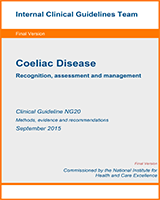NCBI Bookshelf. A service of the National Library of Medicine, National Institutes of Health.
Excerpt
Coeliac disease is an autoimmune condition associated with chronic inflammation of the small intestine, which can lead to malabsorption of nutrients. Dietary proteins, known as glutens, which are present in wheat, barley and rye activate an abnormal mucosal immune response. Clinical and histological improvements usually follow when gluten is excluded from the diet.
Coeliac disease can present with a wide range of clinical features, both gastrointestinal (such as indigestion, diarrhoea, abdominal pain, bloating, distension or constipation) and non-gastrointestinal (such as fatigue, dermatitis herpetiformis, anaemia, osteoporosis, reproductive problems, short stature, neuropathy, ataxia or delayed puberty). Although some people present with typical symptoms, others have few or no symptoms.
People with autoimmune conditions such as type 1 diabetes and autoimmune thyroid disease, or people with a first-degree family history of coeliac disease, have an increased likelihood of coeliac disease.
Contents
- 1. Overview
- 2. Summary section
- 3. Methods
- 4. Evidence for the recognition of coeliac disease
- 5. Evidence for testing for coeliac disease
- 6. Evidence for non-responsive and refractory coeliac disease
- 7. Evidence for information and support related to coeliac disease
- 8. References
- 9. Glossary
- 10. List of abbreviations
- Appendices
Disclaimer: Healthcare professionals are expected to take NICE clinical guidelines fully into account when exercising their clinical judgement. However, the guidance does not override the responsibility of healthcare professionals to make decisions appropriate to the circumstances of each patient, in consultation with the patient and/or their guardian or carer.
- NLM CatalogRelated NLM Catalog Entries
- Wheat starch-containing gluten-free flour products in the treatment of coeliac disease and dermatitis herpetiformis. A long-term follow-up study.[Scand J Gastroenterol. 1999]Wheat starch-containing gluten-free flour products in the treatment of coeliac disease and dermatitis herpetiformis. A long-term follow-up study.Kaukinen K, Collin P, Holm K, Rantala I, Vuolteenaho N, Reunala T, Mäki M. Scand J Gastroenterol. 1999 Feb; 34(2):163-9.
- [Dietary treatment of coeliac disease and dermatitis herpetiformis].[Tidsskr Nor Laegeforen. 2003][Dietary treatment of coeliac disease and dermatitis herpetiformis].Løvik A, Lundin KE. Tidsskr Nor Laegeforen. 2003 Nov 20; 123(22):3237-40.
- Review Coeliac disease: a diverse clinical syndrome caused by intolerance of wheat, barley and rye.[Proc Nutr Soc. 2005]Review Coeliac disease: a diverse clinical syndrome caused by intolerance of wheat, barley and rye.McGough N, Cummings JH. Proc Nutr Soc. 2005 Nov; 64(4):434-50.
- Review Extraintestinal manifestations of coeliac disease.[Nat Rev Gastroenterol Hepatol....]Review Extraintestinal manifestations of coeliac disease.Leffler DA, Green PH, Fasano A. Nat Rev Gastroenterol Hepatol. 2015 Oct; 12(10):561-71. Epub 2015 Aug 11.
- Review Dermatitis herpetiformis: a cutaneous manifestation of coeliac disease.[Ann Med. 2017]Review Dermatitis herpetiformis: a cutaneous manifestation of coeliac disease.Collin P, Salmi TT, Hervonen K, Kaukinen K, Reunala T. Ann Med. 2017 Feb; 49(1):23-31. Epub 2016 Dec 14.
- Coeliac DiseaseCoeliac Disease
Your browsing activity is empty.
Activity recording is turned off.
See more...
